Related Research Articles

Steppenwolf was an American rock band that was prominent from 1968 to 1972. The group was formed in late 1967 in Los Angeles by lead singer John Kay, keyboardist Goldy McJohn, and drummer Jerry Edmonton, all formerly of the Canadian band the Sparrows. Guitarist Michael Monarch and bass guitarist Rushton Moreve were recruited via notices placed in Los Angeles-area record and musical instrument stores.
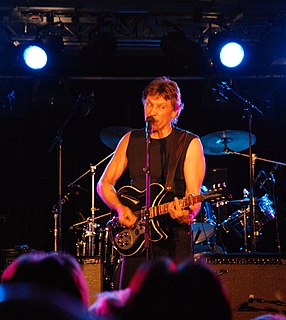
John Kay is a German-born Canadian rock singer, songwriter, and guitarist known as the frontman of Steppenwolf.

"Born to Be Wild" is a song written by Mars Bonfire and first performed by the band Steppenwolf. The song is often invoked in both popular and counter culture to denote a biker appearance or attitude. It is most notably featured in the 1969 film Easy Rider. It is sometimes described as the first heavy metal song, and the second verse lyric "heavy metal thunder" marks the first use of this term in rock music.

"Magic Carpet Ride" is a rock song written by John Kay and Rushton Moreve from the Canadian-American hard rock band Steppenwolf. The song was initially released in 1968 on the album The Second. It was the lead single from that album, peaking at number three in the US, and staying in the charts for 16 weeks, longer than any other Steppenwolf song.
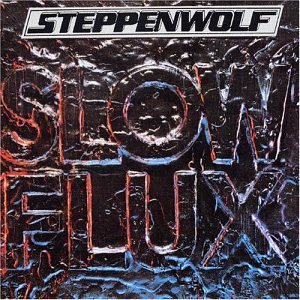
Slow Flux is the seventh studio album by Canadian-American rock band Steppenwolf. The album was released in August 1974, by Epic Records. In the US it was released on the Mums Records label, a short-lived CBS Records subsidiary. It was the first of three albums the band created after reforming in 1974 before they disbanded again in 1976. "Straight Shootin' Woman" was the last Steppenwolf song to chart on the Billboard magazine Top 40. The song "Children of the Night" notably posits that the hippie movement at this time had died, and president Richard Nixon is referred to as "the fool who believed that wrong is right".

Steppenwolf is the debut album by Canadian-American rock band Steppenwolf, released in January 1968 on ABC Dunhill Records.
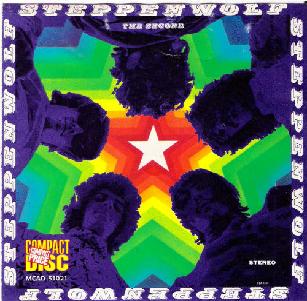
The Second is the second studio album by Canadian-American rock band Steppenwolf, released in October 1968 on ABC Dunhill Records. The album contains one of Steppenwolf's most famous songs, "Magic Carpet Ride". The background of the original ABC LP cover was a shiny "foil", in contrast to later LP issues and the modern CD sleeve.

Steppenwolf 7 is the fifth studio album by Canadian-American rock band Steppenwolf. The album was released in November 1970, by Dunhill Records. It is the first Steppenwolf album with new bass player George Biondo. The album’s numerical title reflects the fact that it was the band’s seventh album release for ABC/Dunhill records . While the album featured Steppenwolf's trademark rock and roll sounds, none of the songs were able to make the top 40. The album featured a cover of Hoyt Axton's "Snowblind Friend", their second cover of one of his antidrug songs. Along with "Who Needs Ya", it was one of two singles from the album which made the charts, but fell short of the top 40. The album track "Renegade" is autobiographical for lead vocalist John Kay, recounting his flight with his mother from the Soviet occupation zone to the West in 1948. The intro to "Earschplittenloudenboomer" is spoken by Kay partially in German.

Steppenwolf Live is primarily a collection of recordings from a single concert early in 1970 at the Santa Monica Civic Auditorium by Steppenwolf staged in support of their 1969 album Monster. Released in April 1970 by Dunhill Records, it contains Steppenwolf's well-known hits: "Born to Be Wild", "Magic Carpet Ride" and "The Pusher", as well as most of the songs from Monster, including three previous top 40 hits, as well as the top 40 hit "Hey Lawdy Mama" from this album.

A Girl Like Me is the second studio album by Barbadian singer Rihanna. It was released on April 10, 2006, by Def Jam Recordings. For the production of the album, Rihanna worked with Evan Rogers, Carl Sturken, Stargate, J. R. Rotem, and label-mate Ne-Yo, who wrote the album's second single. A Girl Like Me is a pop and reggae album influenced by Rihanna's Caribbean roots. The album also incorporates elements of dancehall and rock, as well as ballads, which music critics were ambivalent towards.
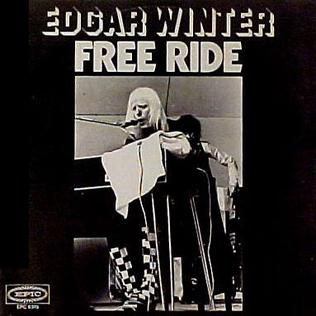
"Free Ride" is a song written by Dan Hartman and performed by The Edgar Winter Group. The single, engineered by Jim Reeves, was a top 15 U.S. hit in 1973, hitting number 14 on the Billboard Hot 100 and number 10 on Cash Box. In Canada, it peaked at number eight.

Almost There is the first studio album by the American Christian rock band MercyMe. Produced by Pete Kipley, it was released on August 14, 2001, by INO Records. After releasing six albums as an unsigned band, they decided to pursue a record contract because it became too difficult to sell albums, book shows, and manage themselves. The band was assigned to work with Kipley, who had not produced a major project before. Four songs on the album had previously appeared on their self-released albums; the rest were newly recorded songs. Critics have characterized the music on the album as contemporary worship and pop rock, with a more radio-friendly sound than the band's self-released albums.

Gold: Their Great Hits is a greatest hits album released by the Canadian-American hard rock band Steppenwolf. The album, released in 1971, charted at #24 on the Billboard Pop Albums charts and was certified "gold" by the RIAA on April 12, 1971. Initial pressings of the album came in a gatefold sleeve, with a detachable poster of the band.
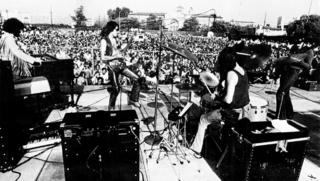
The discography of Steppenwolf, an American Hard rock band, consists of Thirteen studio albums, Nine compilation albums, Twenty-one singles, Three music videos. The band was formed in 1967 after some members of The Sparrows split. Group members included John Kay, Michael Monarch, Goldy McJohn, Rushton Moreve and Jerry Edmonton. Their first album, Steppenwolf, was released in 1968, which sold well and reached 6 on Billboard. That same year, Steppenwolf covered "The Pusher". The song was later used in Easy Rider. The album's most successful single was "Born to Be Wild", which reached No. 2 on the Billboard. At the time of the release of second album, The Second, the band's bassist Rushton Moreve had a dispute with band leader John Kay, and was eventually replaced with Nick St. Nicholas. The album's single was "Magic Carpet Ride" which reached number 3 on Billboard.

Maná MTV Unplugged is a complete live album that was recorded in Miami, Florida for MTV by Mexican rock band Maná. Maná's MTV Unplugged performance was a live show which was performed in an acoustic sound. The live performance was recorded on March 10, 1998 and released on CD and DVD on May 14, 1999 in the Americas and Spain. It includes exclusive re-make versions of the José Alfredo Jiménez song "Te Solte La Rienda", the Rubén Blades song "Desapariciones", and "Se Me Olvidó Otra Vez" by Juan Gabriel. As of 2000, it sold 2 millions of copies.
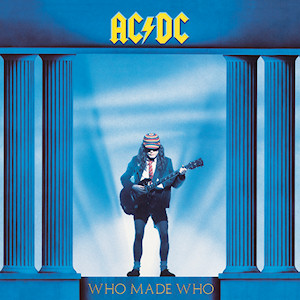
Who Made Who is a soundtrack album by Australian hard rock band AC/DC. Released on 24 May 1986, the album is the soundtrack to the Stephen King film Maximum Overdrive. The album was re-released in 2003 as part of the AC/DC Remasters series.
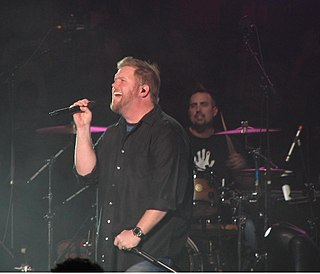
The discography of MercyMe, an American Christian rock band, includes 10 studio albums, two compilation albums, two video albums, and 28 singles. MercyMe, formed in 1994, released six independent albums from 1995–2000 before signing with INO Records and releasing their major label debut album, Almost There (2001). Almost There peaked at No. 37 on the Billboard 200 and No. 1 on the Billboard Christian Albums chart. The band released Spoken For, their second studio album, in 2002; it peaked at No. 2 on the Billboard Christian Albums chart and No. 41 on the Billboard 200. Its second single, "Word of God Speak", spent a record 23 weeks atop the Billboard Christian Songs chart. The album has been certified Gold by the Recording Industry Association of America (RIAA), and has sold over 550,000 copies. In 2003, mainstream radio interest in "I Can Only Imagine", the band's second single from Almost There, caused sales of the album to surge. "I Can Only Imagine" would peak at No. 5 on the Billboard Adult Contemporary chart and No. 71 on the Billboard Hot 100. Almost There was eventually certified triple Platinum by the RIAA, signifying shipments of over 3,000,000 copies, and has sold over 2.2 million copies in the United States.
Casey Donahew is an American Texas country music singer. His last four albums charted on the Billboard US Country top 10. The 2016 album All Night Party reached #3 on the Billboard Country chart, his highest chart position to date. On July 26, 2019, his album One Light Town was released and made its debut at #2 on the Billboard Country Album Sales chart.

The Archies is the debut studio album by The Archies, a fictional pop band from the Archie comics. The album was originally released on the Calendar Records label in 1968 and included 12 songs. It was produced by Jeff Barry and co-produced by Don Kirshner. The band's debut single was "Bang-Shang-A-Lang"; it peaked at No. 22 on the Billboard Hot 100 in 1968. The album peaked on the Billboard 200 chart at number 88. The song "Seventeen Ain't Young" became a Top 40 hit in Australia for Frank Howson in 1969.
"Rock Me" is a song by the Canadian-American hard rock band Steppenwolf. It was released on their 1969 album At Your Birthday Party. It was written by the band's lead singer John Kay, and was the band's fifth American single release. The song was produced by Gabriel Mekler and released as a single in 1969, originally as the B-side to "Jupiter's Child", but the sides were later flipped. It peaked at #10 on the Hot 100 on April 19, 1969 and #6 on both WLS and WCFL. It was both Billboard's and Cashbox's top debut the week of March 1, 1969. The song is considered the highlight of the album though it had been released for the soundtrack well ahead of the album. The song followed on the heels of the band's two 1968 hits, "Born to Be Wild" which peaked at #2 and "Magic Carpet Ride" which peaked at #3. Cash Box particularly praised the "pulverizing vocal performance."
References
- ↑ "Steppenwolf singles".
- ↑ Joe Viglione. "Ride with Me - Steppenwolf | Song Info". AllMusic . Retrieved 2016-10-05.
- ↑ Steppenwolf USA chart history, Billboard.com. Retrieved January 18, 2013.
- ↑ "Archived copy" (PDF). Archived from the original (PDF) on 2010-09-18. Retrieved 2009-10-27.CS1 maint: archived copy as title (link)